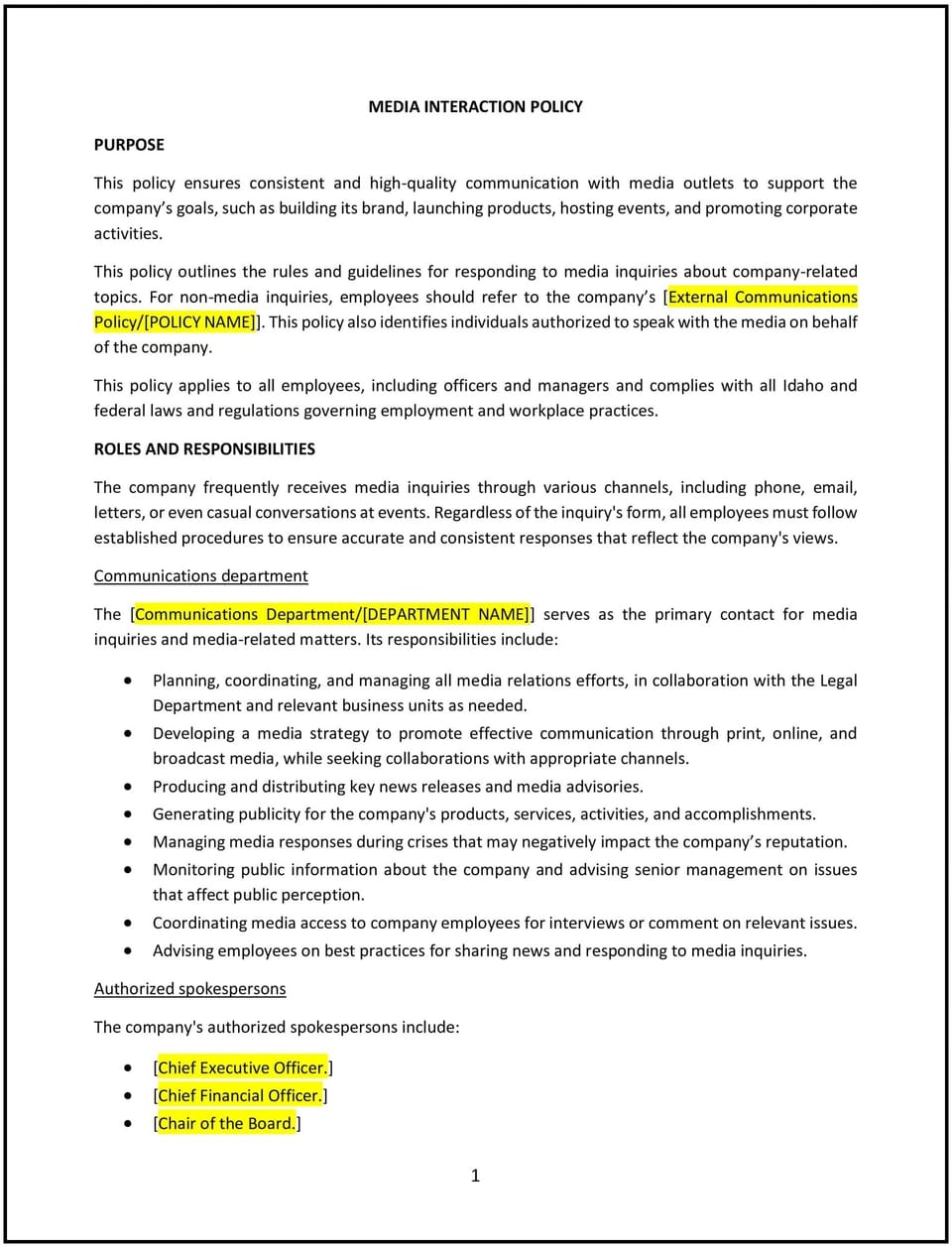Media relations policy (Idaho): Free template

Media relations policy (Idaho)
A media relations policy helps Idaho businesses manage interactions with the media in a consistent and professional manner. This policy outlines guidelines for responding to media inquiries, issuing press releases, and representing the business in public communications. It also designates authorized spokespersons and provides protocols for handling sensitive or crisis-related situations.
By adopting this policy, businesses can maintain a positive public image, protect their reputation, and ensure clear and accurate communication with the media.
How to use this media relations policy (Idaho)
- Designate authorized spokespersons: Identify specific individuals within the business who are authorized to speak to the media. This ensures consistent messaging and reduces the risk of miscommunication.
- Establish response protocols: Create clear guidelines for responding to media inquiries, including timelines, approval processes, and key messaging points. This helps maintain professionalism and accuracy in communications.
- Develop crisis communication plans: Outline steps for addressing media inquiries during crises or sensitive situations. This includes identifying key stakeholders, preparing statements, and coordinating with legal or PR teams as needed.
- Protect confidential information: Emphasize the importance of safeguarding sensitive business information, such as financial data, trade secrets, or employee details, when interacting with the media.
- Train employees: Provide training for employees on the media relations policy, including how to direct media inquiries to authorized spokespersons and avoid unauthorized disclosures.
- Monitor media coverage: Regularly review media coverage of the business to identify potential issues, correct inaccuracies, and capitalize on positive publicity.
- Update the policy as needed: Periodically review and revise the policy to reflect changes in business operations, media trends, or legal requirements.
Benefits of using this media relations policy (Idaho)
This policy offers several advantages for Idaho businesses:
- Maintains a positive public image: Consistent and professional media interactions help build trust and credibility with the public.
- Protects the business’s reputation: Clear guidelines reduce the risk of miscommunication or unauthorized statements that could harm the business’s reputation.
- Ensures accurate messaging: Authorized spokespersons and approved messaging help convey accurate and consistent information to the media.
- Supports crisis management: A structured approach to media relations during crises helps businesses respond quickly and effectively, minimizing potential damage.
- Safeguards confidential information: The policy reinforces the importance of protecting sensitive business information from unauthorized disclosure.
- Enhances employee awareness: Training employees on media relations protocols ensures everyone understands their role in maintaining the business’s public image.
Tips for using this media relations policy (Idaho)
- Communicate the policy clearly: Share the policy with employees through onboarding materials, training sessions, or internal communication platforms to ensure understanding and compliance.
- Designate backup spokespersons: Identify secondary spokespersons in case the primary contacts are unavailable, ensuring the business can respond to media inquiries promptly.
- Prepare press kits: Develop press kits with key information about the business, such as its history, mission, and recent achievements, to provide to the media as needed.
- Build media relationships: Foster positive relationships with local and industry-specific media outlets to enhance the business’s visibility and credibility.
- Monitor social media: Extend the policy to include guidelines for social media interactions, as employees’ personal posts can impact the business’s reputation.
- Review legal considerations: Ensure the policy aligns with Idaho laws regarding defamation, privacy, and intellectual property to avoid legal risks.
Q: Why should Idaho businesses have a media relations policy?
A: A media relations policy provides clear guidelines for interacting with the media, ensuring consistent and professional communication that protects the business’s reputation.
Q: Who should be authorized to speak to the media?
A: Businesses should designate specific individuals, such as executives or PR representatives, who are trained to handle media inquiries and convey approved messaging.
Q: How should businesses handle media inquiries during a crisis?
A: Businesses should follow their crisis communication plan, which may include preparing statements, coordinating with legal or PR teams, and designating a single spokesperson to avoid conflicting messages.
Q: What should businesses do if an employee speaks to the media without authorization?
A: Businesses should address the situation promptly by reminding the employee of the policy and providing additional training if necessary. Unauthorized statements should be corrected or clarified as needed.
Q: How can businesses protect confidential information in media interactions?
A: Businesses should train employees on the importance of confidentiality and ensure authorized spokespersons avoid disclosing sensitive information during media interactions.
Q: How often should businesses review their media relations policy?
A: Businesses should review the policy annually or as needed to reflect changes in business operations, media trends, or legal requirements.
Q: What should businesses include in a press kit?
A: A press kit should include key information about the business, such as its history, mission, leadership team, recent achievements, and high-resolution images or logos for media use.
This article contains general legal information and does not contain legal advice. Cobrief is not a law firm or a substitute for an attorney or law firm. The law is complex and changes often. For legal advice, please ask a lawyer.


